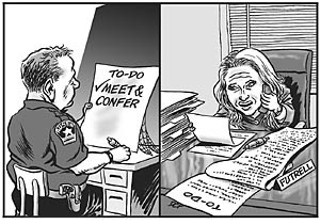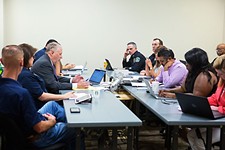Austin @ Large: Oversight, Out of Mind
As the city and police union move forward, what's been left behind?
By Mike Clark-Madison, Fri., March 12, 2004

A not-so-funny thing happened on the way to the new "meet and confer" agreement between the city and the Austin Police Association. People got shot and died, racial strife ensued, City Hall's always fitful forward motion ground to a complete halt, and the city and the police union went briefly to war. Now, at the 11th hour, the City Council and APA membership are voting on a proposed contract that leaders on both sides say responds to the new APD reality and helps move Austin forward – even as advocates for police accountability charge that the public is being left behind.
The City Council will vote – perhaps on consent – today (Thursday) to approve the new agreement; the APA membership will wrap up its voting on March 23, two days before the expiration of the current agreement. So after more than a year at the negotiating table, and only a month after the APA walked away from talks in the wake of the civic crisis created by the Statesman, suddenly everyone is in a great big hurry. Which is never a good thing when dealing with a civic issue of this complexity, but it's probably too late to lay blame now.
A year ago, when the city and APA first began talks on a new five-year contract, the biggest concern on the city's side was money. "We were interested," says City Manager Toby Futrell, "in managing the cost drivers in our budgets," of which the generous salaries of Austin police officers are perhaps the most significant. Since the City Council and the APA both agreed, at least publicly and in principle, to Futrell's 2% "public safety premium" – a bonus above the raises, if any, granted to other city employees – back in August when the budget was adopted, the city's job was largely done months ago, or so it thought.
But as the fallout from the Sophia King and Jessie Owens shootings broadsided City Hall, "a lot of things happened and our original objectives were revised," Futrell says. "We decided to seek enhancements on oversight and on tenure on patrol" – allocating some of the limited new money on the table to rewarding longevity, a response to public concerns about too many unseasoned officers being sent too often into situations too difficult for them to handle, embodied in the public's mind in the person of Officer Scott Glasgow. "There were some lessons learned, and we went in to try to acknowledge and fix those things," Futrell says.
Monitoring the Monitor
For the union, citizen oversight of APD – the marquee item in the last contract – was already something that needed to be fixed. "The officers are looking for some sign that we've depoliticized the process and made it fair for both the officers and the community," says APA President Mike Sheffield. "And I think we've done that, balancing the need for the community to feel that the department is doing what we should be doing, while protecting the rights of officers."
Of course, one can't really "depoliticize" a process that exists for political reasons. In its brief history, the city's Office of the Police Monitor and its Citizen Review Panel have been used – partly on their own initiative, partly by the designs of others – as the venue through which the public's anger at seemingly egregious APD abuses, real or imagined, can be channeled. Whatever the OPM and panel's actual powers to respond to those abuses, they have demonstrated a sense of obligation, or entitlement, to respond to the anger.
Throughout six years of discussion of police oversight, APD, City Hall, and the APA have asserted that the OPM and panel can and should have a less volatile role, as a quality-assurance system that makes recommendations on policies and procedures and basically stays out of the public's eye and APD's face. But nobody in Austin would care about citizen oversight, let alone be satisfied with it, if it only existed for that purpose, if a below-the-radar role was the best we could do.
Hence Futrell's "revised objectives," aimed, in her view, at giving the OPM and panel more power to do what the citizens expect an "oversight" process to do, without thus provoking inevitable conflict with the APA, as happened in both the King and Owens cases. "It's definitely an improvement over what we had before," she says. "We went back in to repair, and in so doing enhance, things that came up when we first came down the chute."
These "enhancements" include some obvious, though carefully limited, authority for the OPM and panel to actually talk about the actions they decide to take. "The panel can give its public explanation as it moves through benchmarks in the process," Futrell says, noting that – as demonstrated in the King case – the current system's vagaries and enforced silences create frustrations for officers as well as citizens.
Beyond Good and Evil?
But the oversight process remains, in the new contract, carefully prescribed and regulated – the effective result of "depoliticizing" the work of the OPM and panel – in ways that community advocates, particularly at the ACLU (which has taken the lead role for years in the effort to bring oversight to APD), feel make the new contract's oversight provisions worse than nothing at all. "The citizens have no greater rights under this process than they do under state civil-service law," says Ann del Llano of the ACLU Police Accountability Project. (Meet-and-confer allows Austin to supersede the provisions of Chapter 143 of the Local Government Code, the state civil-service law that would otherwise apply.)
"But the officer now has far more rights to gain information about citizens and complainants. And there are more loopholes now so that the officer can never be disciplined. It's really shocking and terrifying. This evil, anti-citizen process will be in place for five years. We'll keep working at the Legislature" – where a bill to require police oversight statewide, drafted by the ACLU, died last session – "but the city of Austin has sold us – the citizens – out for now. I wish I knew what to do about it."
Whether you agree with her assessment of the result, Del Llano is probably right that the city has chosen to accept the limitations of APD's oversight process. Despite the APA's constant assertions that officers' rights guaranteed under state law require that the OPM and panel have limited powers, those state-law requirements, in Chapter 143, do not apply to "more than 90% of the police agencies in this state," del Llano notes. Yet the City Council appears in no hurry to try to make Austin part of that majority.
The simple, and bitter, explanation heard often from APD detractors is that "Mayor Sheffield" – in del Llano's words – runs City Hall. Certainly, the union is an interest group both loved and feared at Eighth and Colorado, but even were it not, meaningful oversight would still be a slippery beast to snare. As long as the community cannot agree on how it feels about APD's intrinsic heroism or villainy – whether the cops, by definition, are to be loved or feared – one constituency or another will always be dissatisfied with the powers or the performance of the OPM and its panel.
More salient, right now, is the perceived mandate for "healing" the frayed relationships among APD, the citizenry, the rank-and-file officers, City Hall, the Statesman, and whomever else. This project has added a lot of items to Toby Futrell's to-do list – more so than to Mike Sheffield's – of which meet-and-confer is but one. In that context, the benefit of getting the contract out of the way, in a manner pleasing to the union, could plausibly be seen as outweighing the benefits of a stricter oversight process. We'll have five years to find out. ![]()
Got something to say? The Chronicle welcomes opinion pieces on any topic from the community. Submit yours now at austinchronicle.com/opinion.








